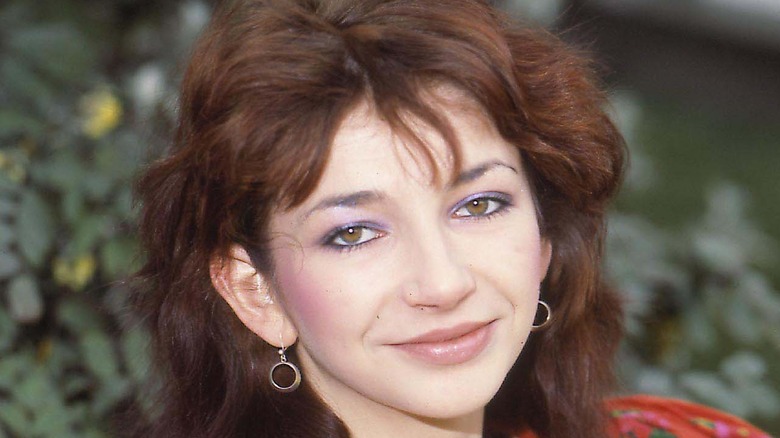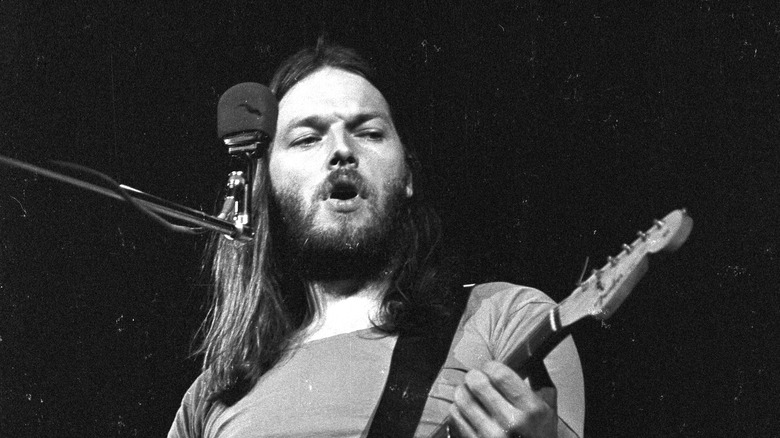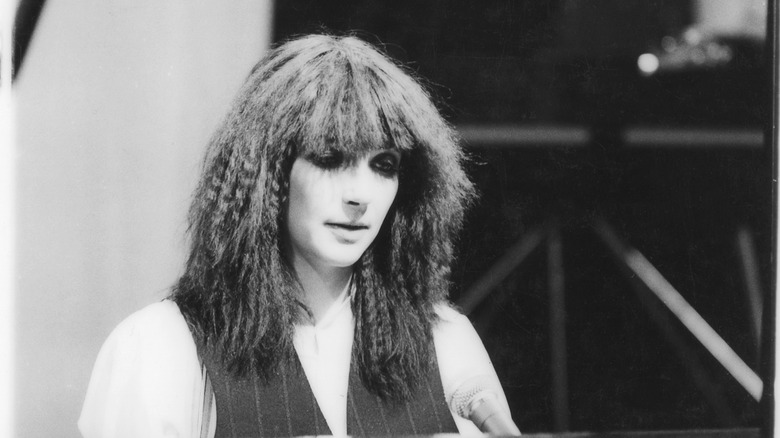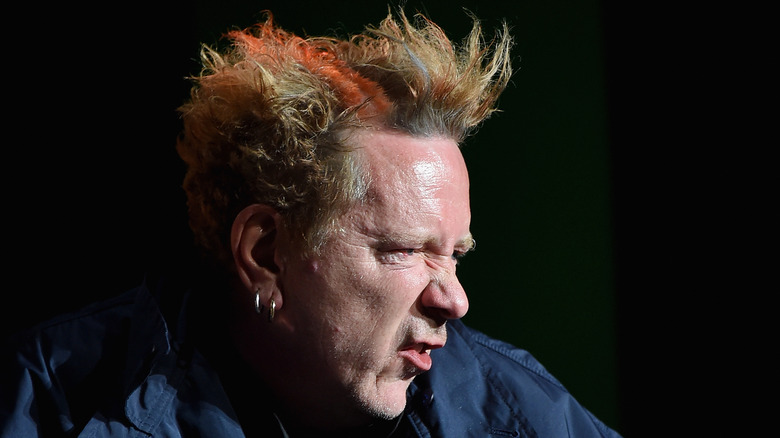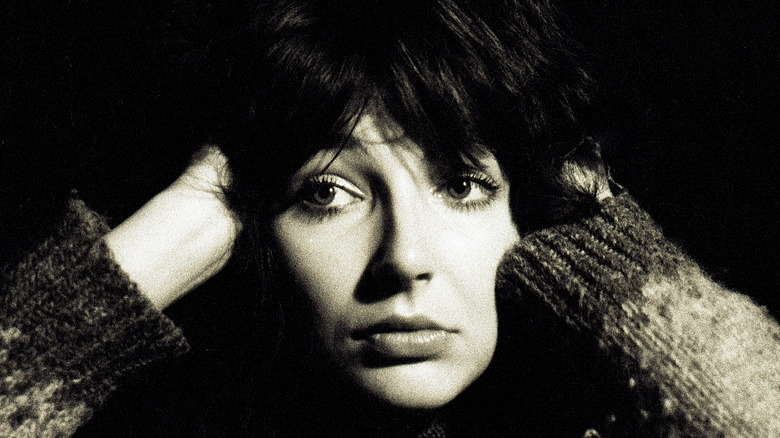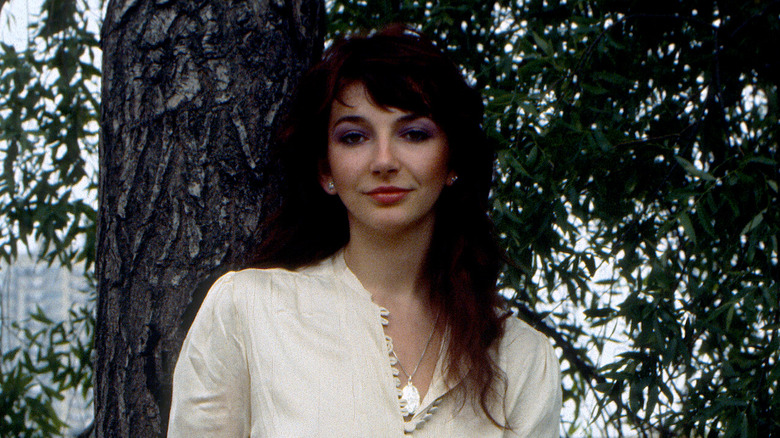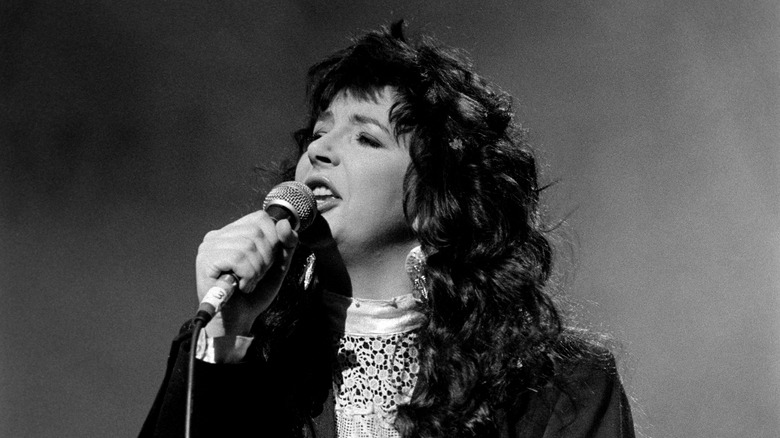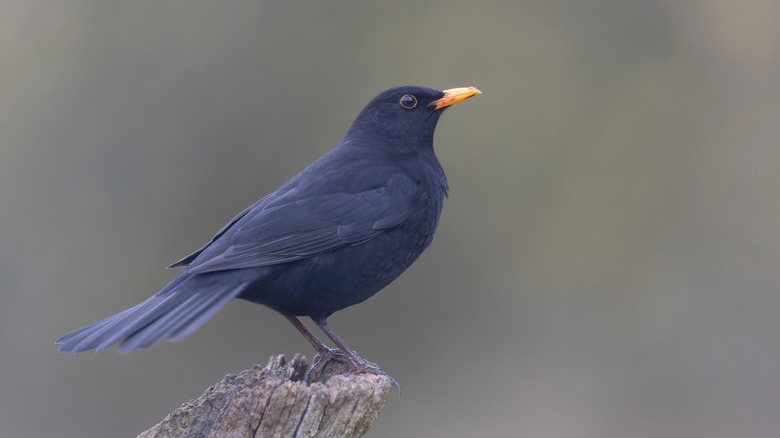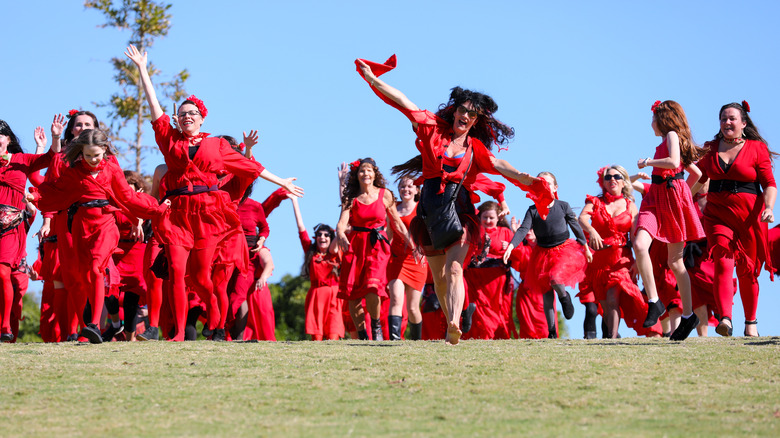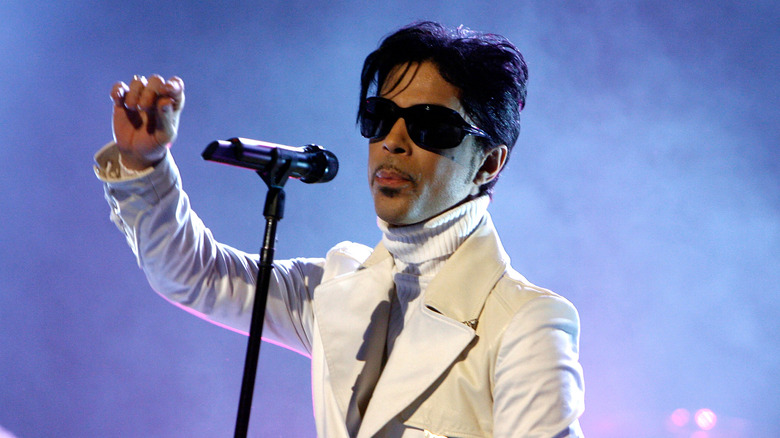The Untold Truth Of Kate Bush
Over the course of four decades the English songwriter, singer, and dancer Kate Bush has exuded an incredible influence over popular music, penning experimental pop classics that have endured to affect how music is written even today.
Artists across a range of genres, such as hip-hop duo Outkast and indie rockers Placebo have shared their admiration for her (per The Guardian), while throughout her singular career she has collaborated with rock and pop royalty in the form of Prince, Peter Gabriel, and Elton John. She has received an Ivor Novello Award for her "Outstanding Contribution to British Music," and has received countless other awards and nominations for her distinctive and boundary-pushing artistry.
Nevertheless, to her many fans, Bush remains something of an enigma, a deeply private individual who, despite her openness and honesty in her increasingly rare interviews, keeps her public persona and her personal life entirely separate. But how did Bush become such a musical icon, and why, in the 2020s, does she continue to attract legions of new fans? Here is her untold truth.
She was mentored by Dave Gilmour
It may be no surprise to learn that Kate Bush came from a creative family. Her mother, Hannah, was a devotee of the traditional music of her native Ireland, and would sing and dance at home. According to Bush's biographer, Rob Jovanovic, Bush would dance too, but privately along to songs that came on the television. Her brother, John, who was 14 years older, was a prolific poet, who would write continuously and share his verses with his younger sister.
But John didn't just set a creative example for the young Kate Bush. Heading away to college while Kate was still a small child, John would make vital friendships that would become instrumental in helping to get his sister's prodigious songwriting talents recognized a decade later, including with Dave Gilmour (pictured), who was soon to become one of the most successful musicians in the world as part of Pink Floyd.
Per the same source, in 1973, while Gilmour was taking a break from touring and recording with Floyd, John invited the musician – who was interested in developing his own acts – to come to the family home and secretly listen to his sister practice her self-written songs on the piano. Gilmour was impressed enough to begin working with Kate – then better known as "Cathy" – and worked with her on a professionally-recorded demo, which included the classic song "The Man with the Child in His Eyes." She was barely 15 years old, but would eventually find herself signed to EMI on the road to pop stardom.
Kate Bush's debut had to compete with punk
As Kate Bush continued to work on her material, she also spent years in London, where she took singing lessons and attended courses in dance and mime to broaden her artistic palette, according to the biographer Rob Jovanovic.
By 1978, Bush was ready to release her music into the world. But the world of music had turned dramatically since the heady art rock days of Pink Floyd's pomp. At the time, the UK was experiencing the aftershocks of the punk explosion the previous year, with young music fans convinced that pop songwriting could never be the same again. Punk seemingly imbued all corners of the music industry with a new sense of rebelliousness, while for lighter-hearted listeners disco was the dancefloor-filling genre of the day.
Per The Independent, Bush's debut single, "Wuthering Heights," an eccentric, romantic song of yearning based on the novel of the same name by Emily Brontë, subverted the landscape, sounding like nothing else in the pop charts at the time. The song went to No. 1 in the U.K., an instant breakthrough that allowed Bush to release two full studio albums in the same year to critical acclaim and commercial success.
Kate Bush achieved a female songwriting breakthrough
Despite the immense impact of "Wuthering Heights," Kate Bush's debut single was so confounding to many music fans and journalists that it was assumed it was nothing more than a strange novelty single, according to The Independent, while Bush herself became a divisive figure among the pop-following public. It would take years and the release of much more Bush material – culminating perhaps in her biggest-selling pop album, 1985's "Hounds of Love," for her enduring artistry to become undeniable even to those who failed to appreciate her singular pop aesthetic.
But while Bush has grown into a musical icon for pop songwriters everywhere, her importance for women artists in the U.K. music industry was far more immediate. As highlighted by The Guardian, "Wuthering Heights" was notable for being the first song by a woman to hit the top of the singles chart that the artist herself had composed. The feat may not be attention-grabbing today in the age of heavyweight pop songwriters like Taylor Swift and Adele, but Bush's breakthrough constituted a highly symbolic moment for women musicians.
Johnny Rotten wrote a song for Kate Bush
As Kate Bush's career progressed, it became apparent that she was both a single-minded experimentalist and a consummate craftswoman, with the technical songwriting and performance abilities necessary to fulfill her unconventional musical vision.
And while Bush's music may appear to be the antithesis of the punk movement it so strongly contrasted with back in the late 1970s, she came to could among her fans several figures from punk's ranks, not least the original British punk snarler John Lydon, a.k.a. Johnny Rotten. Lydon has been effusive in his praise for Bush in numerous interviews over the years, including a 2001 interview in which the Sex Pistols frontman noted that both he and Bush had shared the experience of attracting ire from critics for their unconventional vocal styles. And even more surprisingly, it has also emerged that Lydon wrote a song for Bush, hoping that she would perform it.
Lydon told Uncut magazine in 2014: "Years ago, I sent [Bush] a song I'd written. I don't think she understood it. It was called "Bird In Hand." It was about the illegal exportation of parrots from South America. No, don't laugh! It's a serious subject. It's cruel. But I think she thought it was a reference to her, which it certainly wasn't!" Bush never recorded the song, though the rejection doesn't seem to have impacted Lydon's admiration for her. "She's a wonderful, wonderful woman," he added, "Stunningly innovative and creative. One of our finest."
Kate Bush claimed to be apolitical
Today, political activism among pop stars is an expected aspect of their public lives. In an age of wider political engagement as a result of the internet and more readily accessible information about prevailing political and societal issues, this is to be expected, though a more cynical argument could be put forward that activism has become a necessary part of a working pop star's PR machine, just as other more conventional brands conduct PR tactics such as greenwashing.
It is common in the 21st century to hear that everything is political. But in Kate Bush's heyday, openness about one's political affiliations wasn't perhaps such a necessity and was certainly something that the British singer strove against sharing. As Rob Jovanovic notes in "Kate Bush: The Biography," by 1980 Bush was tackling political themes in songs such as "Army Dreamers" and "Breathing," which addressed The Troubles in Northern Ireland and potential nuclear apocalypse respectively. But Bush rejected their being labeled "political songs," arguing: "It's only because the political motivations move me emotionally. If they hadn't, it wouldn't have gotten to me. It went through the emotional center." (via the same source)
Bush may have been right to avoid direct political commentary. In 2016, Bush attracted criticism for airing her support for conservative British Prime Minister Theresa May, though she later clarified her position, claiming that she is "not a [Conservative Party] supporter" and that she was simply praising May as a woman political leader, per The Guardian.
'Cloudbusting' is based on a true story
A huge part of Kate Bush's success was her willingness to harness the new medium of music videos, which were growing in importance as marketing devices and extensions of the songs themselves in the early years of her career. From "Wuthering Heights" to 1985's massive single "Running Up That Hill," Bush starred in some of the most iconic music videos of the period. But it was perhaps the follow-up to "Running Up That Hill," "Cloudbusting," which best exemplifies the musician's ability to use all the tools at her disposal to expand her chosen theme.
The video shows Kate Bush in the guise of a young boy, whose father, played by Donald Sutherland, is an eccentric scientist and inventor of a "cloudbusting" machine who is arrested, leaving the boy alone. The story sounds like the stuff of fantasy, but in fact was inspired by the real-life memoirs of Peter Reich, whose father, the Austrian-born Wilhelm, was a psychoanalyst who truly believed he had created such a machine. Per Dazed, Bush read Reich's memoir and was moved by the portrayal of the father-son relationship, inspiring the unusual hit song.
When the video was complete, Bush sent a copy to Reich for his approval, who said that he and his family were "entranced. Quite magically, this British musician had tapped precisely into a unique and magical fulfillment of father-son devotion, emotion, and understanding. They had captured it all." (via Dazed)
Kate Bush's wilderness years
Despite enjoying 15 years of considerable commercial success and widespread critical acclaim, following the release of her album "The Red Shoes" in 1993 – the year she also directed the musical short film "The Line, The Cross and The Curve," which she later described as "a load of b****cks," according to The Guardian – by 1994, Kate Bush largely retreated from the glare of public life.
Soon, her absence from the music industry became tabloid fodder, with newspapers labeling her a misfit and a recluse and speculating on her mental health and private life. Among her fans, however, it became the stuff of legend, provoking works of art that attempted to penetrate her intense privacy. The 2007 documentary "Come Back Kate" explores the impact her absence had on those who love her music, while more eccentric projects such as "Waiting for Kate Bush," a book by John Mendelssohn described as a "hybrid of satirical comic novel and music biography" which, along with the life story of Kate Bush, offers a fictional story of a super fan attempting to connect with his missing musical hero.
Bush only made a handful of public appearances during these years before re-emerging in 2005, with her long-awaited double album "Aerial."
Kate Bush kept the birth of her first child a secret
But despite the paranoid fantasies of Kate Bush's millions of fans, the reclusive singer hadn't turned her back on fame as the result of a nervous breakdown or strange new creative obsession. As would eventually be revealed, Bush – who, it is worth recalling, first shot to pop fame at the tender age of 19 – was enjoying living a normal life of domesticity and parenthood.
News that Bush had become a parent emerged alongside news of her comeback through her friend Peter Gabriel, who in an interview told the world: "Kate had a son and lost her mom and I think that kept her occupied. I spoke to her quite recently in fact and she's just about finished on a new record. It is exciting. She's being a mom and loving it. So, if you like, music's gone from being full-time to being part-time, so that slows you down" (via "Kate Bush: The Biography"). The news that Bush had given birth to a son, Bertie, only appeared in print some five years after the child's birth, per the Evening Standard.
In an interview with The Guardian, Bush explained that she valued learning the mundane necessities of domestic life, such as vacuuming and doing laundry, saying that she felt "privileged" that she had been able to carve out a normal life for herself and her family despite her fame.
Kate Bush's usual favorite singers
Think of your favorite singer, and you also probably know who their favorite singer is, too. For Paul McCartney, no one beats Little Richard. For David Bowie, vocal inspiration came from avant-garde crooner Scott Walker. And Adele has made no secret of the fact that her great hero is the classic blues singer Etta James.
So it might be expected that Kate Bush would similarly wear her influences when it comes to vocalists proudly on her sleeve. But perhaps unsurprisingly, Bush gave a rather unusual answer when asked this common music press interview question, telling an interviewer in 1996 that her favorite singer was the blackbird (her second favorite, per the same source, is the thrush).
Bush's love of the blackbird is apparent on her 2005 comeback album "Aerial," which features as part of its sleeve art the waveform of a blackbird's song, as well as recordings of birdsong throughout the album.
'Wuthering Heights' becomes a world record target
In 2013, one particular iconic Kate Bush performance – which was first released some 35 years prior, at the start of her career – again rose to pop culture prominence thanks to an eccentric stunt that took place in the English city of Brighton's Stanmer Park.
Per The Argus, in May of that year around 300 Kate Bush fans – dressed in the instantly recognizable red dress outfit from the music video to her debut single "Wuthering Heights" – and performed a mass recreation of Bush's dance, attempting to get the stunt into the Guinness Book of World Records.
Guinness failed to recognize the event as a genuine record attempt, disappointing organizers, one of whom told The Argus: "Why Guinness will not recognize 300 people dressed as Kate Bush dancing in a field I will never know." Nevertheless, "Wuthering Heights Day" has since become a yearly event in the calendars of Kate Bush fans, with similar gatherings organized in many cities across Europe, the Americas, the Middle East, and the Antipodes.
Bush's grief at the loss of Bowie and Prince
Though Kate Bush continued to keep press appearances to a minimum throughout the 21st century, in 2016 she was driven to share her thoughts on two artists whose deaths deeply affected millions: David Bowie, who died in January of that year, and Prince (pictured), who died in April.
Bush had been a lifelong Bowie admirer, having witnessed him performing live in his seminal final concert in the guise of Ziggy Stardust, according to Mojo. Speaking to The Guardian in the aftermath of Bowie's death, Bush praised the "Starman" singer, claiming he "had everything. He was intelligent, imaginative, brave, charismatic, cool, sexy, and truly inspirational both visually and musically." Almost as if she were describing herself, she also described him as a quintessential English eccentric.
Similarly, Bush was quick to pay tribute to Prince, whom she had collaborated with on her 1993 album "The Red Shoes." A statement published on Bush's official website read: "He was such an inspiration. Playful and mind-blowingly gifted. He was the most inventive and extraordinary live act I've seen. The world has lost someone truly magical. Goodnight dear Prince" (via NME). Elsewhere, Bush praised his playfulness and sweet character, as well as his incredible productivity in contrast to the slow process of her own songwriting.
Stranger Things and the Kate Bush revival
Though Kate Bush has continued to keep projects to a minimum in recent decades, there have nevertheless been some moments when the English songwriter has come to dominate the cultural zeitgeist.
One such moment occurred in 2014, when Bush, who had not performed on stage for 35 years by that point, announced that she would perform a 22-date London residency, titled "Before the Dawn," tickets for which reportedly sold out in 15 minutes. Rolling Stone later described the shows as a "spectacular" return to live performance.
But another more unexpected Kate Bush moment occurred as recently as 2022, when the singer's seminal 1985 single "Running Up That Hill" was featured heavily in the fourth season of the 1980s-set Netflix horror drama "Stranger Things." The prominence of the song on the hit series – the script for which Bush read personally before giving clearance for her song's use – made the song an unexpected summer smash, sending it to the top of the iTunes chart in both the U.K. and the U.S., according to The Guardian, and launching it up the Billboard Hot 100. Billboard reports that over the course of the final week of May, Spotify plays for the song in the U.S. rose by around 9,900%.
